We
do not have to believe—as the rationalists say we do—in another dimension of
pure thought, with herds of “forms” or “distinct ideas” roaming its plains, in
order to have confidence in our own ability to reason. By nature or nurture, or
by subtle combinations of the two, we acquire and pass on to our children those
concepts that enable their carriers – that is, us – to survive. In short, reason’s
roots can be explained in ways that don’t assume any of the things that rationalism
assumes.
Now rationalism’s
really disturbing implications start to occur to us. Wouldn’t I love to believe
that there is some hidden dimension in which the forms exist, perfect and
eternal? Of course I would. Then I would know that I was “right.” Then I and a
few simpatico acquaintances might agree among ourselves that we were the only
people truly capable of perceiving the finer things in life or of recognizing
which are the truly moral acts. Our training and natural gifts would have
sensitized us to be able to detect the beautiful and the good. For us to
persuade the ignorant masses would be only rational; considering their incapacity
to figure things out—it would be an act of mercy.
This
view is not just theoretically possible. It was the view of some of the disciples
of G.E. Moore almost a century ago and, even more blatantly, of some of the
followers of Herbert Spencer a generation before that. (Explanations of the
views of Moore and Spencer can be found in Wikipedia articles online.3,4)

G.E. Moore (credit: Wikimedia Commons)

Herbert Spencer (credit: Wikipedia)
I am
being sarcastic about the sensitivity of Moore and Spencer’s followers, of
course. Both my studies and my experience of the world tell me there are more
than a few of these kinds of sensitive aristocrats roving around in today’s
world, in every land (the neocons of the West?). We underestimate them at our
peril. The worst among them don’t like democracy. They yearn to be in charge,
they have the brains to secure positions of authority, and they have the
capacity for lifelong fixation on a single goal. Further, they have the ability
to rationalize their way into truly believing that harsh and duplicitous
measures are sometimes needed to keep order among the ignorant masses—that is, everyone
else.
My conclusion
was that rationalism was far too often a companion of totalitarianism.
The reason did not become clear to me until my thirties, when I learned about
cognitive dissonance and figured the puzzle out. I now see how inclined
toward rationalization other people are and how easily, even insidiously, they
give in to it. On what grounds can we tell ourselves that we are above this
very human weakness? Should we tell ourselves that our minds are somehow more morally aware or more disciplined, and are therefore immune
to such self-delusions? I am aware of no logical grounds for that conclusion about myself or anyone else I have met or whose works I have read.
In
addition, evidence revealing this capacity for rationalization in human minds—some
of the most brilliant of human minds—litters history. How could Pierre Duhem,
the brilliant French philosopher, have written off relativity theory just
because a German proposed it? (In 1905, Einstein was considered, and considered
himself, a German.) How could Martin Heidegger or Werner Heisenberg have
endorsed the Nazis’ propaganda? The Führer principle! German science yet! Ezra
Pound, arguably the best literary mind of his time, on Italian radio defending Fascism. Decent people today recoil and even despair.

George Bernard Shaw (credit: Wikimedia Commons)

Jean-Paul
Sartre (credit: Wikimedia Commons)
How
could George Bernard Shaw or Jean-Paul Sartre have become apologists for
Stalinism? So many geniuses and brilliant minds of the academic, scientific,
and artistic realms fell into this trap that one wonders how they could have
made such mistakes in their practical, everyday realm. Once we understand how
cognitive dissonance reduction works, the answer is painfully obvious.
Brilliant thinkers are just as brilliant at self-comforting thinking—namely,
rationalizing—as they are at clear, critical thinking. And the most brilliant
specious terms and fallacious arguments they construct—that is, the most
convincing lies they tell—are the ones they tell themselves.
No comments:
Post a Comment
What are your thoughts now? Comment and I will reply. I promise.